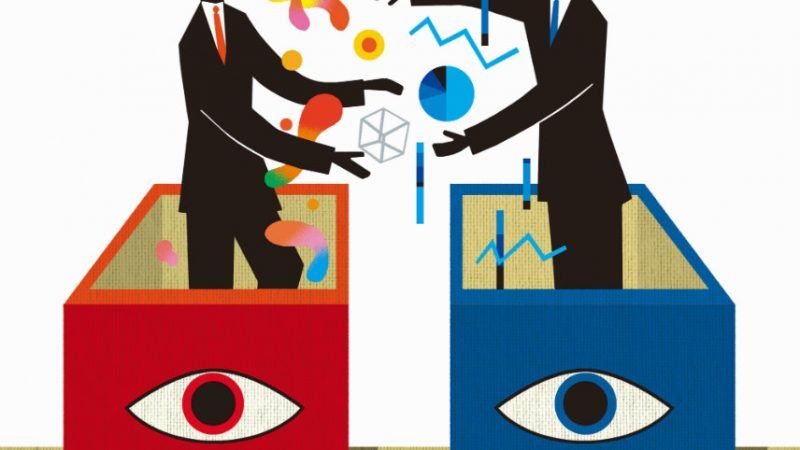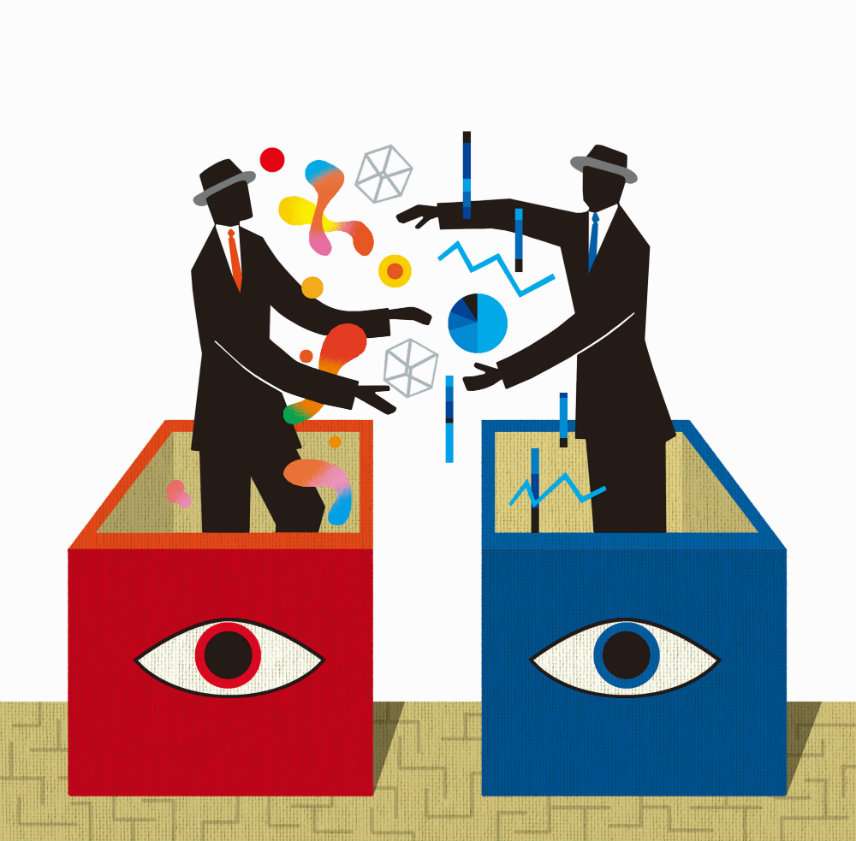Don't Count on Americans Hating Each Other Any Less Post-Midterms
Baffled by and fearful of each other, the political tribes remain consumed by loathing and dedicated to total victory.


To judge by the reactions to last week's mid-term elections, casting votes isn't the key to settling political tensions in the United States. As I write, Republicans are publicly accusing Democrats of manufacturing ballots to steal elected offices, while Democrats charge that Republicans somehow gerrymandered state borders to swipe victories in Senate races. It's as if the members of America's two dominant political tribes so despise each other that assuming some degree of decency on each other's part is out of the question. So hang on for a ride that's not getting smoother anytime soon.
"Many Americans think people in the other party are ignorant, spiteful, evil and generally destroying the country," Kim Hart of Axios reports of a new poll conducted just before the election by SurveyMonkey. "About half of Democrats think Republicans are ignorant (54%) and spiteful (44%). Likewise, about half of Republicans think Democrats are ignorant (49%) and spiteful (54%). 21% of Democrats think Republicans are evil, and about the same share of Republicans (23%) think Democrats are evil."
That would be disturbing enough in itself—liberal democracies don't function especially well when voters think they're opposing not bad policy, but rather the personification of all that is bad and wrong. But this is only the latest survey to discover such antipathy between America's political tribes.
"Currently, 44% of Democrats and Democratic leaners have a very unfavorable opinion of the GOP," the Pew Research Center noted last year. "45% of Republicans and Republican leaners view the Democratic Party very unfavorably."
That built on earlier Pew data finding that "More than half of Democrats (55%) say the Republican Party makes them 'afraid,' while 49% of Republicans say the same about the Democratic Party."
And yes, it's getting worse.
"The percentage of partisans who really seem to hate the other party has skyrocketed since the turn of the millennium," write political scientists Marc Hetherington and Jonathan Weiler of the University of North Carolina. After 2000, "the percentage of partisans with hate in their hearts rose with each election: from the 20s and 30s for Democrats and Republicans in 2008, to 48 and 50 percent, respectively, in 2016. Clearly, hating the opposite political party is no longer a fringe thing." Hethington and Weiler draw on data compiled by the American National Election Studies.
So Americans are at daggers-drawn, and it appears that their mutual dislike is increasing in intensity.
Making the situation more potentially intractable is the vast gulf between the tribes not just in terms of their partisan associations, but also what motivates them. Hetherington and Weiler write that people are largely divided between what they call "fixed" and "fluid" personalities that represent very different perceptions of the relative safety of the world in which we live, the importance of fixed rules, and the relative merits of self-reliance versus obedience to established order. There's more to it, of course, but the important point, they say, is that these personality types have increasingly sorted themselves along partisan lines, with "fixed" types going Republican and "fluid" types aligning as Democrats. Many people fall along a spectrum between fixed and fluid, but have felt compelled in recent years to pick one partisan tribe or the other. Possessing entirely different, and seemingly innate, worldviews, the two tribes now have little common ground over which to peacefully engage.
In their analysis, Hetherington and Weiler delve into territory similar to that pioneered by social psychologist Jonathan Haidt with his moral foundations theory. Haidt believes that, in the American context, conservatives, progressives, and libertarians are largely divided by the extent to which they value six innate moral foundations that define what they consider important and good. Even the way they understand the meaning of such values as "fairness" are at odds, complicating the task of finding a shared language for discussion and making debates challenging because people have very different ideas of what makes for desirable outcomes.
Confused?
Let's just say that the political tribes' brains work differently, and they're scared and baffled by what makes their opponents tick.
These differences have always existed, but not so clearly aligned with partisan identity, and not usually when the stakes were so high as they are now in political contests. I'll argue—again—that in a society in which everything is politicized, and in which winning an election means gaining control of lawmaking, licensing authority, and regulatory apparatus that can be and frequently are used to punish political enemies, nobody can afford to lose.
Lifestyle and occupations are now closely aligned with political identity—a "starkly divided world of latte-sipping liberals and bird-hunting conservatives," as Daniel DellaPosta, Yongren Shi, and Michael Macy of Cornell University wrote in a paper published in 2015 in the American Journal of Sociology. That means opponents' hobbies and occupations can be targeted for destruction-by-government without overtly running afoul of protections for what they believe and how they vote (although, emboldened by the political environment, politicians are going to that extreme, too).
If the tribes are unable to understand each other's worldviews or values, it's difficult to see how they settle their differences and learn to deescalate the country's cycle of political conflict.
"If Americans are this convinced that the other side isn't just wrong, but dumb and evil, they'll never be able to find enough common ground to solve real problems," Axios's Kim Hart remarked in her piece on partisan animosity.
Maybe there isn't much room for common ground. Perhaps the only path forward is to decentralize power to make it easier for people to live the way they want without being subject to the rule of the hated foe.
To the extent possible, we should decentralize power and declaw the government so that people don't have to worry what the enemy has in store for them.Or, we could just wait to see what a growing wave of tribal loathing does to the country.

Show Comments (80)